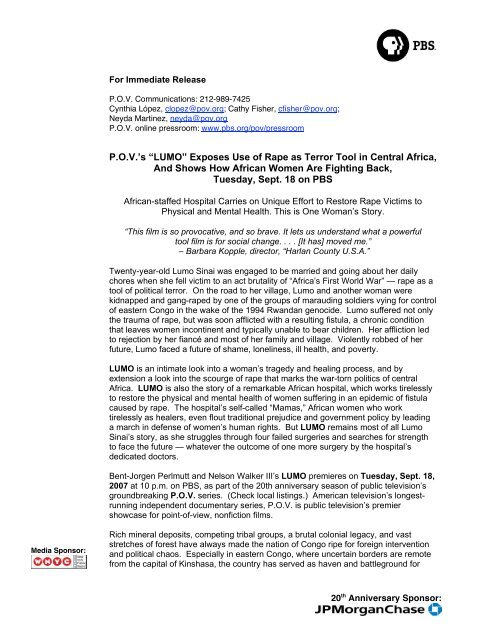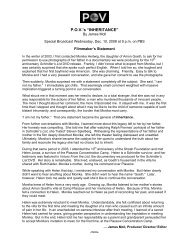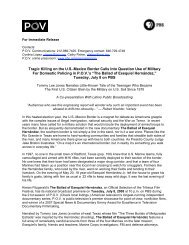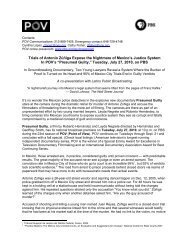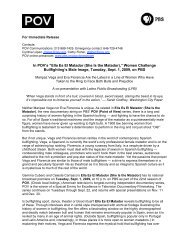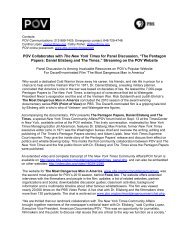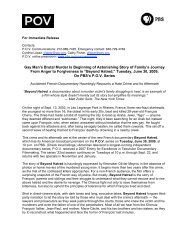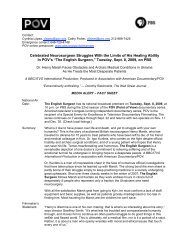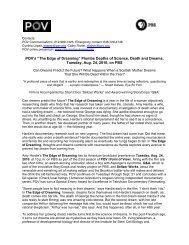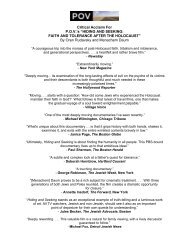LUMO - American Documentary, Inc.
LUMO - American Documentary, Inc.
LUMO - American Documentary, Inc.
- No tags were found...
Create successful ePaper yourself
Turn your PDF publications into a flip-book with our unique Google optimized e-Paper software.
For Immediate ReleaseP.O.V. Communications: 212-989-7425Cynthia López, clopez@pov.org; Cathy Fisher, cfisher@pov.org;Neyda Martinez, neyda@pov.orgP.O.V. online pressroom: www.pbs.org/pov/pressroomP.O.V.’s “<strong>LUMO</strong>” Exposes Use of Rape as Terror Tool in Central Africa,And Shows How African Women Are Fighting Back,Tuesday, Sept. 18 on PBSAfrican-staffed Hospital Carries on Unique Effort to Restore Rape Victims toPhysical and Mental Health. This is One Woman’s Story.“This film is so provocative, and so brave. It lets us understand what a powerfultool film is for social change. . . . [It has] moved me.”– Barbara Kopple, director, “Harlan County U.S.A.”Twenty-year-old Lumo Sinai was engaged to be married and going about her dailychores when she fell victim to an act brutality of “Africa’s First World War” — rape as atool of political terror. On the road to her village, Lumo and another woman werekidnapped and gang-raped by one of the groups of marauding soldiers vying for controlof eastern Congo in the wake of the 1994 Rwandan genocide. Lumo suffered not onlythe trauma of rape, but was soon afflicted with a resulting fistula, a chronic conditionthat leaves women incontinent and typically unable to bear children. Her affliction ledto rejection by her fiancé and most of her family and village. Violently robbed of herfuture, Lumo faced a future of shame, loneliness, ill health, and poverty.<strong>LUMO</strong> is an intimate look into a woman’s tragedy and healing process, and byextension a look into the scourge of rape that marks the war-torn politics of centralAfrica. <strong>LUMO</strong> is also the story of a remarkable African hospital, which works tirelesslyto restore the physical and mental health of women suffering in an epidemic of fistulacaused by rape. The hospital’s self-called “Mamas,” African women who worktirelessly as healers, even flout traditional prejudice and government policy by leadinga march in defense of women’s human rights. But <strong>LUMO</strong> remains most of all LumoSinai’s story, as she struggles through four failed surgeries and searches for strengthto face the future — whatever the outcome of one more surgery by the hospital’sdedicated doctors.Bent-Jorgen Perlmutt and Nelson Walker III’s <strong>LUMO</strong> premieres on Tuesday, Sept. 18,2007 at 10 p.m. on PBS, as part of the 20th anniversary season of public television’sgroundbreaking P.O.V. series. (Check local listings.) <strong>American</strong> television’s longestrunningindependent documentary series, P.O.V. is public television’s premiershowcase for point-of-view, nonfiction films.Media Sponsor:Rich mineral deposits, competing tribal groups, a brutal colonial legacy, and vaststretches of forest have always made the nation of Congo ripe for foreign interventionand political chaos. Especially in eastern Congo, where uncertain borders are remotefrom the capital of Kinshasa, the country has served as haven and battleground for20 th Anniversary Sponsor:
Congolese insurgents and armed groups spilling over from wars in neighboring countries. The endof the Rwandan genocide sent thousands of Hutu militiamen, the Interhamwe, responsible for themass murder of Tutsis and moderate Hutus, fleeing to the Congolese forests, where they werepursued by the new Tutsi-dominated Rwandan army.Their struggle became entangled with a long-running insurgency against the crumbling Mobuturegime and cross-border tensions with other nations, helping to fuel the First and Second CongoWars. The latter, lasting from 1998 to 2003, involved nine African nations and some 20 armedgroups, and led to the death of nearly 4 million people, earning it the epithet of “Africa’s First WorldWar.” As in some other African conflicts, child soldiers, drugs, superstition, and a virulent terrorizingof women characterized the fighting.Lumo Sinai was a victim of this war. About the rape, she puts it simply enough: “They destroyed us.”Forsaken by everyone except her mother, she finds that village healers can do little to relieve thesymptoms of her fistula — especially the incontinence that so shames and marks her. But she doeslearn about “counselors searching for raped women.” They represent a hospital in Goma, supportedby HEAL Africa, which offers nothing less than a miracle — reconstructive surgery that has a highsuccess rate of reversing the effects of rape-induced fistula, even allowing women to give birth.The journey to health for Lumo and other women is not easy. Even the road trip to Goma is troubledby breakdowns, illness, and armed soldiers by the roadside. Once at Goma, however, Lumo andthe others meet an indomitable force for good in the persons of Mama Jeanne, Mama Muliri, MamaChakupewa, Mama Kahindo, Mama Sifa, Mama Sara, and Mama Riziki. These buoyant, inspiringwomen are administrators, nurses, counselors, social workers, and human-rights activists all atonce. They provide the support structure that allows the doctors — and the women — to succeed.With Lumo, the Goma staff wrestles with a particularly difficult case. After four failed surgeries, sheis running out of chances to heal. Lumo’s mood is, by turns, hopeful and bitter, cooperative andcontrary, as she struggles with the enormity of what has happened to her. She seems suspendedbetween adolescence and adulthood, one moment dreaming girlishly of marriage and babies, andthe next acidly questioning the reality or goodness of a god who allows such atrocities to befallinnocent people. Her disruptive behavior and impious remarks raise eyebrows among the patientsand test the Mamas. Will Lumo fall into that minority of women who do not respond to the surgicaltreatment? How does a traumatized and marginalized woman find the strength to resume life even ifthe surgery is successful?For all the political complexities and violence of the Congo Wars, their human cost is powerfully andawfully captured in <strong>LUMO</strong> — in the heartbreaking but also heartening battle for health and dignitywaged by women who, along with their children, have suffered the worst atrocities, and who face themost enduring social and psychological consequences of central Africa’s descent into chaos.“Getting a grasp on the Congo — its wars, political machinations, and bewildering ethnic rivalries —is difficult, perhaps contributing to the relative obscurity of the humanitarian disaster on the worldstage,” say the directors. “We only began to understand it ourselves when we spent the fall of 2004in the frontier town of Goma. We were volunteers making medical training videos for HEAL AfricaHospital, an NGO whose directors were our generous hosts.“Congo’s wealth of beauty and its tragic history could occupy any filmmaker for a thousand years,but our story was the one that we were compelled to choose because of its searing immediacy,” theycontinue. “We returned in the fall of 2005 eager to put a human face on this situation. Lumo was atthe center of a group of girls battling the tedium of waiting for treatment by playing jacks, catchinggrasshoppers, and singing hymns. When we asked whether anyone would like to share their storywith us, it was Lumo who was the first to step forward.”
About the filmmakers:Bent-Jorgen PerlmuttDirector/Producer/CinematographerBent-Jorgen S. Perlmutt served as the co-producer and additional editor of the documentary “ControlRoom” (2004), and has directed, edited, shot, and/or produced films for the United NationsDevelopment Fund for Women, The U.S. Department of Education, WGBH Boston, and the GlobalLeadership Campaign. He has taught documentary filmmaking at Columbia University and servedas an instructor in Northern Uganda for WITNESS. He’s currently a correspondent for UNICEF andis producing several short films on child soldiers in Congo for them. Perlmutt, who started outstudying medicine, holds a bachelors degree with honors in screenwriting from Brown University anda masters in fine arts with honors in film directing at Columbia University. He lives in New York.Nelson Walker IIIDirector/Producer/CinematographerNelson Walker III holds a bachelors degree in <strong>American</strong> civilization from Brown University. He beganhis career as a writer, penning documentaries for the Discovery Channel, History Channel, andPBS's “NOVA.” His directorial debut, “iThemba|Hope,” aired on the Sundance Channel in 2005.Walker works regularly as a cinematographer for renowned documentary film company MayslesFilms, and is a founding member of the Maysles Films Institute, a non-profit organization committedto using film to empower marginalized individuals and communities. He was the 2005 recipient ofthe Albert Maysles Award for Excellence in <strong>Documentary</strong> Filmmaking at the Dallas Video Festival.Walker has worked extensively in Tibet, as a visiting instructor at Tibet University in Lhasa andcontributor the Tibetan & Himalayan Digital Library Project. In 2006, he traveled to the Kham regionas a documentarian for the Kham Geotourism Project, an initiative launched by the University ofVirginia, Machik, and the Maysles Films Institute. Walker will receive his master of fine arts degreein film directing from Columbia University this fall. He lives in New YorkLouis AbelmanCo-Director/ProducerLouis Abelman is a freelance writer living in New York. This is his first film. After attending BrownUniversity, where he majored in African history, he worked for the International Herald Tribune inParis, where he later wrote an op/ed about the war in the Congo. For the past two years whileworking on <strong>LUMO</strong> he has been an editorial assistant at The New York Times, posted variously onthe Foreign, Metro, Society, and Editorial desks.Lynn TrueCo-Director/EditorLynn True graduated from Brown University with a joint degree in urban studies and architecture.She was an assistant editor for PBS, AMC, and NBC News Productions before moving on to editdocumentary and narrative films. Her editing credits include “Chain Times Three” (Museum ofModern Art), “iThemba|Hope” (Sundance Channel), and “Asparagus! A Stalk-umentary” (which wonan <strong>American</strong> <strong>Documentary</strong> | P.O.V. “Art of the <strong>Documentary</strong> Pitch” grant at the Museum ofTelevision and Radio’s Film Festival in 2005). Past projects have also screened on Current TV, theMuseum of Television and Radio, Brooklyn Academy of Music, Anthology Film Archives, IFC Center,as well as at festivals and conferences around the world. Recently, True traveled to the Khamregion of Tibet to work on a documentary production of the Maysles Film Institute. She is returningthis year to complete a short film about Tibetan nomads. She lives in New York.Credits:Directors/Producers:Producer/Co-Director:Editor/Co-Director:Cinematographers:Writers:Bent-Jorgen Perlmutt and Nelson Walker IIILouis AbelmanLynn TrueNelson Walker III and Bent-Jorgen PerlmuttBent-Jorgen Perlmutt, Nelson Walker III, Louis Abelman,and Lynn True
Running Time: 56:46In Swahili, French and English with English subtitles.Awards & Festivals:• Student Academy Award, Best <strong>Documentary</strong>, 2007• Columbia University Film Festival, 2006 – National Board of Review of Motion Pictures Award• Media That Matters Film Festival, 2006 – Global Health Award• Full Frame <strong>Documentary</strong> Film Festival, Durham, N.C., 2007• Human Rights Watch Film Festival, New York and London, 2007• United Nations Film Festival, New York, 2007Produced by <strong>American</strong> <strong>Documentary</strong>, <strong>Inc</strong>. and celebrating its 20th season onPBS in 2007, the award-winning P.O.V. series is the longest-runningshowcase on television to feature the work of America's best contemporaryissueindependent filmmakers. Airing Tuesdays at 10 p.m., June through September, with primetimespecials during the year, P.O.V. has brought nearly 250 award-winning documentaries to millionsnationwide, and now has a Webby Award-winning online series, P.O.V.'s Borders. Since 1988, P.O.V.has pioneered the art of presentation and outreach using independent nonfiction media to build newcommunities in conversation about today's most pressing social issues. More information about P.O.V isavailable online at www.pbs.org/pov.P.O.V. Interactive (www.pbs.org/pov)P.O.V.'s award-winning Web department produces special features for every P.O.V. presentation,extending the life of P.O.V. films through filmmaker interviews, story updates, podcasts, streaming video,and community-based and educational content that involves viewers in activities and feedback. P.O.V.Interactive produces our Web-only showcase for interactive storytelling, P.O.V.’s Borders. In addition,www.pbs.org/pov houses Talking Back, where viewers can comment on P.O.V. programs, engage indialogue and link to further resources. The P.O.V. Web site and P.O.V. archives, including special sitesfrom previous broadcasts, form a unique and extensive online resource for documentary storytelling.P.O.V. Community Engagement and EducationP.O.V. provides Discussion Guides for all films as well as curriculum-based P.O.V. Lesson Plans forselect films to promote the use of independent media among varied constituencies. Available free online,these original materials ensure the ongoing use of P.O.V.’s documentaries with educators, communityworkers, opinion leaders and general audiences. P.O.V. works closely with local PBS stations to partnerwith museums, libraries, schools and community-based organizations to raise awareness of the issues inP.O.V.’s films. P.O.V.’s Youth Views expands these efforts by working with youth-service organizations.Major funding for P.O.V. is provided by the John D. and Catherine T. MacArthur Foundation, the NationalEndowment for the Arts, the New York State Council on the Arts, the Ford Foundation, the EducationalFoundation of America, PBS and public television viewers. Funding for P.O.V.’s Diverse Voices Project isprovided by the Corporation for Public Broadcasting, with additional support from JPMorgan ChaseFoundation, the official sponsor of P.O.V.'s 20th Anniversary Campaign. P.O.V. is presented by aconsortium of public television stations, including KCET Los Angeles, WGBH Boston, and Thirteen/WNETNew York.<strong>American</strong> <strong>Documentary</strong>, <strong>Inc</strong>. (www.americandocumentary.org)<strong>American</strong> <strong>Documentary</strong>, <strong>Inc</strong>. (AmDoc) is a multimedia company dedicated to creating, identifying andpresenting contemporary stories that express opinions and perspectives rarely featured in mainstreammedia outlets. AmDoc is a catalyst for public culture, developing collaborative strategic engagementactivities around socially relevant content on television, online and in community settings. These activitiesare designed to trigger action, from dialogue and feedback to educational opportunities and communityparticipation. Simon Kilmurry is executive director of <strong>American</strong> <strong>Documentary</strong> | P.O.V.TAPE REQUESTS: Please note that a broadcast version of this film is available upon request, as the film maybe edited to comply with new FCC regulations.


